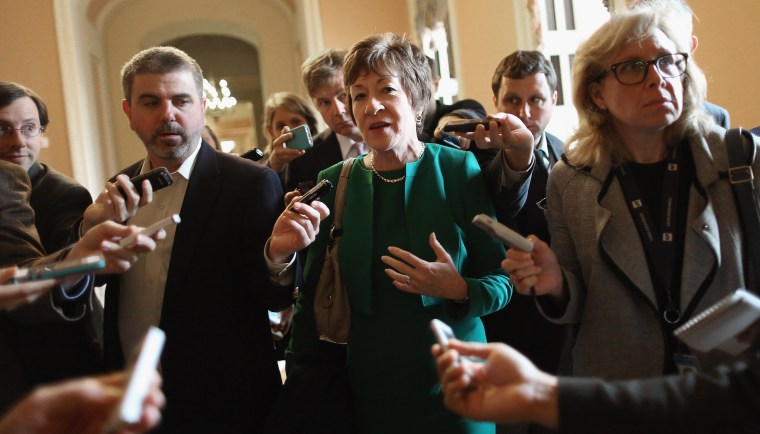I'd thought about creating some kind of flow chart to capture ongoing developments in Capitol Hill, but quickly gave up. As Jonathan Cohn noted, it would have simply been too messy.
By my count, no less than four separate conversations are taking place right now: The White House is talking to House Republicans and, separately, it to Senate Republicans. In the Senate, moderate Republicans are talking to the Democratic leadership. In the House, Republicans from the party's extreme wing are talking to Republicans from the not-so-extreme wing, all under the watchful eye of the caucus leaders.And that's just the official dialogue. Staff and outside interest groups are talking amongst themselves. The subject of these talks include myriad variations on how to write a bill reopening the government and giving it new borrowing authority, for different durations of time and under different conditions -- or no conditions at all.
That ought to clear things up, right?
It's been nearly two weeks since congressional Republicans shut down the government, and we're just days from a debt-ceiling calamity, suggesting policymakers should theoretically be working towards some kind of resolution. But while there was a flurry of activity yesterday, it was largely a lot of sound and fury signifying nothing.
House Republicans, for example, thought they'd presented the White House with a credible offer: Congress would temporarily raise the debt ceiling, the government would remain closed, Democrats would accept Medicare and/or Social Security cuts, and the severity of the sequestration cuts that neither party likes would be eased. President Obama declared this ajoke, told House GOP leaders he could probably get a better offer from Senate Republicans, and so dejected House members promptly left Capitol Hill yesterday.
Sen. Susan Collins (R-Maine), meanwhile, thought she too had come up with a solution: Congress would reopen the government for six months and raise the debt limit for a year. Democrats would have to accept sequestration levels and throw in a two-year delay of the medical-device tax in the Affordable Care Act, and in exchange, Republicans would concede nothing. Yesterday, Democrats rejected this as wholly unacceptable, too.
And as a practical matter, it doesn't much matter that Dems didn't like it, since House Republicans said they'd refuse to even vote on the Collins plan -- a plan in which Republicans give up nothing except temporary hold on some hostages -- even if the Senate approved it and even if House GOP leaders could tolerate it.
So what happens now?
With House members having given up, at least for now, talks are now underway between Senate Majority Leader Harry Reid (D-Nev.) and Senate Minority Leader Mitch McConnell (R-Ky.). What, if anything, they can expect to accomplish is unclear.
And even if they reached some sort of resolution, it may not matter, since House Republicans still appear to be in a sociopathic mood, and may simply reject anything that emerges from the upper chamber, no matter the consequences.
The anxiety levels are exceedingly high.
For what it's worth, I remain fond of the "Congress does its job" plan. It goes like this: the government needs to be funded, and since the parties already agree on funding levels, Congress should do its job and reopen the government -- neither side makes demands, neither side takes a hostage, neither side asks for concessions from the other, and neither side relies on extortion.
Similarly, the nation needs to pay its bills, and since the parties already agree that default would be catastrophic, Congress should do its job and extend the Treasury's borrowing authority -- neither side makes demands, neither side takes a hostage, neither side asks for concessions from the other, and neither side relies on extortion.
For reasons that only make sense to them, Republicans consider the "Congress does its job" plan to be wildly offensive and a proposal so outrageous, they'd rather hurt Americans on purpose than vote for it.
Tick tock.
